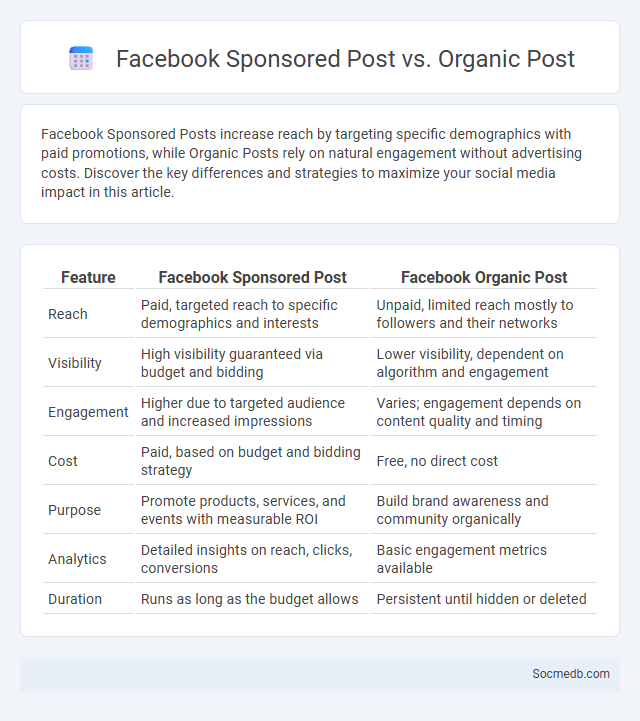
Photo illustration: Facebook Sponsored Post vs Organic Post
Facebook Sponsored Posts increase reach by targeting specific demographics with paid promotions, while Organic Posts rely on natural engagement without advertising costs. Discover the key differences and strategies to maximize your social media impact in this article.
Table of Comparison
| Feature | Facebook Sponsored Post | Facebook Organic Post |
|---|---|---|
| Reach | Paid, targeted reach to specific demographics and interests | Unpaid, limited reach mostly to followers and their networks |
| Visibility | High visibility guaranteed via budget and bidding | Lower visibility, dependent on algorithm and engagement |
| Engagement | Higher due to targeted audience and increased impressions | Varies; engagement depends on content quality and timing |
| Cost | Paid, based on budget and bidding strategy | Free, no direct cost |
| Purpose | Promote products, services, and events with measurable ROI | Build brand awareness and community organically |
| Analytics | Detailed insights on reach, clicks, conversions | Basic engagement metrics available |
| Duration | Runs as long as the budget allows | Persistent until hidden or deleted |
Overview of Facebook Post Types
Facebook offers diverse post types including status updates, photo and video uploads, event promotions, polls, and live streams, each designed to enhance user engagement and content variety. Photo and video posts typically generate higher interaction rates, while polls foster direct audience feedback and participation. Event promotions and live videos allow businesses to create real-time connections and build community around specific activities or announcements.
What is a Facebook Organic Post?
A Facebook organic post refers to content shared on a user's or business's Facebook timeline without paid promotion, relying solely on natural reach and user engagement. These posts appear in the news feeds of followers and friends based on Facebook's algorithm, which considers relevance, engagement, and timeliness to determine visibility. Effective organic posts include engaging text, images, videos, or links designed to foster interaction without the influence of paid advertisements.
What are Facebook Sponsored Posts?
Facebook Sponsored Posts are paid advertisements that promote specific content to a targeted audience beyond an organic reach. These posts appear directly in users' news feeds, increasing visibility and engagement by leveraging Facebook's advanced targeting options such as demographics, interests, and behavior. Marketers use Sponsored Posts to boost brand awareness, drive website traffic, and generate leads efficiently within the social media platform.
Key Differences: Organic vs Sponsored Posts
Organic social media posts rely on unpaid content shared naturally by users or brands, generating engagement through genuine interactions and community building. Sponsored posts involve paid promotions designed to reach targeted audiences with greater precision, often leveraging detailed demographic and behavioral data. While organic posts prioritize authenticity and trust, sponsored content emphasizes reach, visibility, and measurable return on investment.
Audience Reach: Organic vs Sponsored Content
Maximizing your audience reach on social media requires understanding the differences between organic and sponsored content. Organic content builds authentic engagement by leveraging your existing followers through shares, comments, and likes, making it ideal for long-term brand loyalty. Sponsored content uses targeted advertising to expand your reach beyond current followers, efficiently increasing visibility and driving specific actions like website visits or conversions.
Budget Considerations: Paid vs Free Strategies
Budget considerations play a crucial role in social media strategy, where paid advertising offers targeted reach and measurable ROI, while free strategies rely on organic content and community engagement. Allocating your budget effectively depends on your business goals, audience demographics, and desired growth speed. You must balance investment in paid campaigns with consistent, quality free content to maximize visibility and engagement across platforms.
Engagement Metrics: Comparing Performance
Engagement metrics such as likes, comments, shares, and click-through rates provide crucial insights into how your audience interacts with social media content. Analyzing these metrics across different platforms helps identify which channels deliver the highest user interaction and content resonance. Focusing on engagement performance enables you to tailor strategies that maximize visibility and foster stronger community connections.
Content Optimization for Each Post Type
Content optimization for each social media post type enhances engagement by tailoring visuals, captions, and hashtags to platform-specific algorithms. Videos should capitalize on autoplay features with strong opening frames, while images benefit from high resolution and concise text overlays. Your strategy must adapt to these nuances to maximize reach and interaction across channels.
When to Use Organic vs Sponsored Facebook Posts
Organic Facebook posts build authentic engagement by sharing valuable content with your existing audience, fostering trust and long-term community growth. Sponsored posts boost visibility quickly by targeting specific demographics, ideal for promoting time-sensitive offers or expanding reach beyond your current followers. Use organic posts to nurture Your relationships and sponsored posts strategically to amplify your brand's presence.
Best Practices for Maximizing Facebook Impact
Maximizing Facebook impact requires consistent posting with high-quality, engaging content tailored to your target audience's interests and behaviors. Use Facebook Insights to analyze performance metrics, optimize posting times, and refine ad targeting for higher reach and engagement. Encourage interaction through compelling calls-to-action and respond promptly to comments to build a strong community around Your brand.
 socmedb.com
socmedb.com